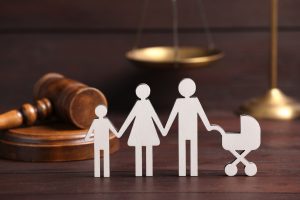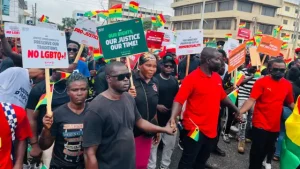And many of us, whether we were inspired by movies or a hard-hitting event occurring on the other side of the globe, have at one point been motivated, and somewhat simultaneously disheartened, by witnessing the fight for human rights. For some lawyers, human rights may have been the first push into them realising law was the journey they wanted to venture down.
We speak with Jennifer Obaseki, whose experience in human rights has taken her to stages worldwide including the United Nations and Cambridge University, campaigning against harmful traditional practises from Africa, gender-based violence (against women) and female genital mutilation. How does she do it? Find out below.
I was surprised at how little we respect each other’s rights and, in general, the lack of basic respect for human life.
What was your motivation for specialising in human rights law?
When I started working on immigration law, I enjoyed helping the corporate clients that needed assistance during investment opportunities or wanted to apply for schemes to allow foreign workers to join their companies. But, alongside this, I also had many clients suffering, as a result of discrimination. This included students that could no longer return to countries that were under on-going conflict. The failure of the states offering protection and actually victimising people due to their tribe, politics, gender or social group had taken me aback and when I witnessed someone's human rights being breached, it would light a fire in my stomach. I was thus driven to gaining the client’s perspective and applying for the best level of protection for them.
What were the aspects which took you by most surprise when first delving into human rights?
I was surprised at how little we respect each other’s rights and, in general, the lack of basic respect for human life. An example is a refugee: they leave their country looking for protection but despite their obvious need for help, they still need to fight to be heard, fight for access to legal services and even to get basic subsistence. I find this extremely sad.
The similarities in problems and causational factors from country to country was also enlightening. As human beings, we have more things in common than aspects that differentiates us, yet we do not value and respect each other.
We need to protect women with such legislation, ensuring jurisdictions protect the rights to education, equal pay and equal treatment.
What has been your challenging case yet? And how did you overcome the challenges?
Each case has its own challenges. We work on commercial cases and one important victory I had was against a bank that failed to take sufficient action to prevent a fraud against my client’s account. Initially, they stated our client was liable for all expenditure, but we were able to show serious negligence by the bank, so we were not liable and secured our cost.
We have also been successful in actions against police for excessive force, thousands of cases for delay in settlement and entry visa refusal. But I had a unique case where a British man was refused entry to the United Kingdom as he was wrongly accused of identity fraud. We won that case despite barriers being put against us.
It is essential that states take the necessary steps to ensure prevention, detection and a good support system is provided for these women, so they are not exploited.
Honing in emotion to fight against highly sensitive and emotive cases, such as female genital mutilation (FGM), I imagine can be difficult. How do you build up to work on these cases, ensuring you are at your best ability during on tough cases such as these?
Many of the areas I deal with are highly charged. Some have to do with culture, religion, or children and are extremely sensitive. I am human first and so I try to assimilate the information and I do find myself constantly thinking about my cases because I am passionate about my work and doing the right thing by my client.
I do have many years of experience, so now I find that things which might shock others, somewhat do not surprise me much anymore. I'd rather analyse disturbing situations and have a very professional demeanour when dealing with these issues. I ensure I have a very clear focus on instruction and how to achieve the best result for my client. My client can be the parents who may be guilty, falsely accused or an organisation that wants me to train them how to catch the people causing harm to children. My aim is to apply the law in the best manner to achieve the best result for the respective client.
As I specialise in training front line workers dealing with harmful traditional practices and preventing violence against women, I find that attending global conferences enables me to establish the best global practice in my field.
In your opinion: what can be done to tackle gender-based violence?
It is essential to have a uniform approach to issues so there is clarity in the law and a uniform standard. We need to protect women with such legislation, ensuring jurisdictions protect the rights to education, equal pay and equal treatment.
People should not be able to leave one country and commit a crime in another because ‘it is easier’. To tackle this, I believe there should be a global definition of criminal offences, uniform legislation relating to equal treatment and co-operation on enforcement of breaches. Also, teaching self-value, self-respect and the importance of preventing gender-based violence, to children in age appropriate terms will help tackle such injustice and violence and will outline clear respect for the rights of women and girls, whilst promoting and encouraging better treatment towards and by all ethnic groups and all generations.
The culture within any society is important, but when traditions dictated by culture are detrimental and cause harm, specifically to women and girls, it is a serious problem. Statistics confirm that women and girls represent a high proportion of those moving around the world and thus are more likely to be the victims of trafficking. It is essential that states take the necessary steps to ensure prevention, detection and a good support system is provided for these women, so they are not exploited. Statistics do show that not enough is being done, therefore appropriate training from the government through to grass root level is essential.
We need to realise that it is not about competition, it is about collaboration.
Can you expand on your experience speaking at the United Nations? How did you prepare yourself for that?
I have recently returned from a conference addressing trafficking but have previously been a panellist and spoken about FGM. I always align myself with the theme and research up to date papers and then apply my practical experience alongside my social interpretation. It is important to also look at the issue from a global perspective whilst also seeing how it applies and affects people locally. I look at issues that affect mainly women and girls in African and in the diaspora communities in Europe, especially in the United Kingdom. As I specialise in training front line workers dealing with harmful traditional practices and preventing violence against women, I find that attending global conferences enables me to establish the best global practice in my field.
Helping a woman up the ladder does not mean you have to take a step down.
How can women work together to support other women, rather than against each other? Can this extend to the legal workplace?
We need to realise that it is not about competition, it is about collaboration. Your environment, including your business environment, will thrive if it is enabling; when women work together great things happen and when it goes well there is a sense of sisterhood and support. But each woman has to have that same mindset and sadly not all of us do… some do have claws!
Helping a woman up the ladder does not mean you have to take a step down. From my own experience, I have found that women can be just as competitive as men at executive level, however, when you realise that collaborating does not remove competitiveness, you actually accomplice more and progress quicker. Legal environments are very competitive; as lawyers, we strive to win. But we can also achieve good results with settlements, saving our clients’ time, money and stress, so it is not always about being aggressive in order to ‘win’, but being tactful and negotiating well. We must not be naïve, as at the end of the day ‘business is business’, and so maintaining clear working terms, conditions and agreements is essential for cohesion. Entwining all these factors will push for a more collaborative and supportive atmosphere.
Ms Jennifer Obaseki
FOUNDER AND SENIOR PARTNER
Holding a BA in Law and Economics, Jennifer founded Obaseki Solicitors and is the senior partner. With her successes in representing clients with difficult immigration and human rights matters spreading internationally, the practice is considered to have leading influence. The firm specialises and is dedicated to improving human rights, family rights as well as assisting clients to develop successful businesses- they have acquired a number of awards and extensive testimonials.




















